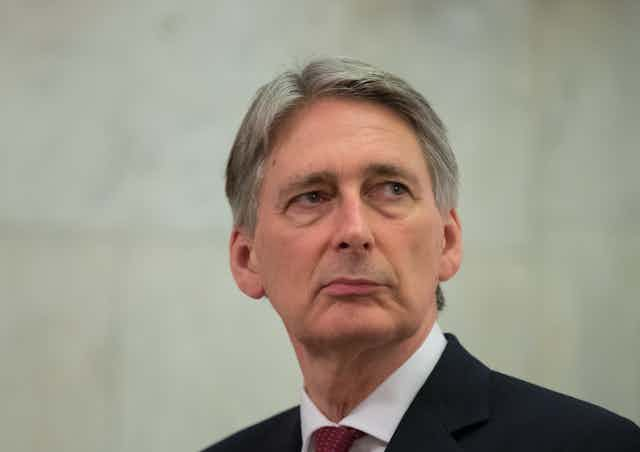The UK chancellor of the exchequer’s speech at the Mansion House tends to be a good political barometer of the state of the British economy and its prospects, and the extent to which there is agreement or not between members of the government on economic policy.
Two years ago, in the wake of a general election victory which had seen the Conservative party restored to single party government, George Osborne used his Mansion House speech to set out a confident vision of the future:
A new settlement for the British economy. A new settlement for the way we manage our public finances. A new settlement in what we ask of your important industry, financial services. A new settlement in Britain’s relationship with our partners in the European Union.
How quickly times have changed. Philip Hammond’s 2017 Mansion House speech – postponed because of the Grenfell Tower fire – seemed to offer no confidence in the new political and economic settlement offered by Brexit for the UK.
Instead, read alongside the accompanying speech from governor of the Bank of England, Mark Carney, it offered a stark warning of the dangers of a cliff-edge, “hard” Brexit.
Ridicule
Hammond did not specifically describe his preferred Brexit as “soft”. He instead called for a “flexible and pragmatic” approach. However, he could not have been clearer in his rejection of the “no deal is better than a bad deal”, Brexit via the cliff-edge option. No sooner had Hammond finished, one influential manufacturing trade body was duly warning of the dangers of a “cliff edge” Brexit.
Carney, meanwhile, questioned “the extent to which Brexit is a gentle stroll along a smooth path to a land of cake and consumption” – a transparent ridiculing of foreign secretary Boris Johnson’s belief that Britain could “have our cake and eat it”.
Managed borders, but open
While Hammond affirmed that the UK would leave the EU, he also noted:
We’ll almost certainly need an implementation period, outside the Customs Union itself, but with current customs border arrangements remaining in place, until new long-term arrangements are up and running.
It was part of his central idea that the UK must depart the EU “in a way that works for Britain” and which protects British jobs and prosperity. Anything less, he said “will be a failure to deliver on the instructions of the British people”, who after all had not voted to become more impoverished. Economic needs must be placed ahead of “taking back control” of UK sovereignty, not to mention any considerations of negotiating early free-trade deals or closing borders. Indeed, Hammond said the UK must remain “open to the talent, the ideas and the capital that have driven the success of our economy in the past, and will drive it in the future” – the vote for Brexit must mean managing immigration, not closing the door.

Questions remain over austerity
Hammond emphasised the “need to lead a global crusade for liberalisation of services”, and to protect the City of London and wider economy against the dangers of protectionism – something George Osborne had identified two years earlier. However, outside the EU itself it’s hard to see in which forums Hammond will be able to make this case with sufficient authority to recruit others to his cause.
Finally, the chancellor reaffirmed that austerity and the aim of balancing the public finances has not been abandoned, only postponed until 2025. There is no planned reset of UK economic policy, and he reminded his audience that “we must not lose sight of the unchanging economic facts of life. Funding for public services can only be delivered in one of three ways: higher taxes; higher borrowing; or stronger economic growth”.
The lesson Hammond seems to have taken from the general election is that “we must make anew the case for a market economy and for sound money”. But having added more than £700 billion to the UK’s national debt since May 2010, and with Mark Carney warning of “the first lost decade since the 1860s”, one might have imagined Hammond arriving at a very different conclusion about austerity measures, given the electorate’s verdict upon it.
‘Row of the summer’ fizzes out
The events of the past 24 hours suggest Theresa May’s government is anything but ready for what lies ahead. On the first day of Brexit negotiations, David Davis immediately capitulated to the EU’s insistence on settling the Brexit divorce bill before starting trade talks, having previously warned this would prompt the “the row of the summer”.
This rather confirms suspicions that behind the bluster and vacuous soundbites (“no deal is better than a bad deal”) the British government has no clear or credible negotiating strategy on any of the key aspects of the UK’s future relationship to the single market, customs union, or freedom of movement. This only increases the risk of a catastrophic hard Brexit.
And so Philip Hammond’s 2017 Mansion House speech was long on coded warnings, and short on optimism and hope. It underlines the smouldering cabinet divisions between the chancellor and prominent Brexiters like David Davis, Boris Johnson, Liam Fox and Michael Gove. And with the Conservatives split – once again – over Europe, such internal divisions threaten the longevity of an already weakened administration, and seem to herald a summer of profound political discontent.

